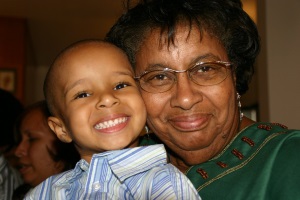What is Grandma's Rule?
In my grandma's day, it was understood that children had certain responsibilities as members of the family. They "earned" their privileges by fulfilling their responsibilities first. The idea behind this rule is that you acknowledge something the child would like to do as the second step in a process. You define the first step as a chore, action or activity that must be done before the privilege is granted.
The benefits to this approach are threefold. First, your request is very specific, and thus can be understood by your child. Second, you are acknowledging your child's wants and needs at the same time that you are stating you wants and needs. Third, you are approaching the issue in a way the invites your child to cooperate. Here's how it works:
You may ________ after you __________.
You may play outside after you do the dishes.
You may watch a movie after you do your homework.
We will read a story after you put your pajamas on.
As soon as you scoop the cat litter you can play your new computer game.
An added benefit to using Grandma's Rule is that it eliminates the need to use "fighting words." Fighting words are those that start a battle even before the rest of the sentence is heard-words such as, You can't, Don't, No, and Stop!
Notice how the choice of words affects the feeling conveyed by these requests:
You can't go outside until you finish your homework.
Yes, you can go outside just as soon as you finish your homework.
Don't eat that cookie until after your dinner.
Yes, you can have a cookie right after dinner.No, you can't go to Jimmy's house.
You can go to Jimmy's house on Saturday, after soccer practice.
As you can see, Grandma's rule allows you to use positive communication while being very specific about what you want. And the best thing is-it works!
Hidden Messages : What Our Words and Actions Are Really Telling Our Children Paperback by Elizabeth Pantley
“Elizabeth Pantley’s new book is the wake-up call every parent needs, a consciousness-raising journey through the small moments of parenthood. Each chapter uses warmth, compassion, and humor to gently tweak the consciences of even the best parents, and inspire them to raise their children in a more sensitive manner.”
-- William Sears, M.D. from the foreword
(Excerpted with permission by NTC/Contemporary Publishing Group Inc. from Hidden Messages – What Our Words and Actions are Really Telling Our Children by Elizabeth Pantley, copyright 2001)
About the Author
Parenting educator, Elizabeth Pantley, is the president of Better Beginnings, Inc., a family resource and education company.
She is a regular radio show guest and often quoted as a parenting expert in magazines such as Parents, Parenting, Working Mother, Woman's Day, Good Housekeeping and Redbook
he publishes a newsletter, Parent Tips, that is distributed in schools nationwide, and is the author of Kid Cooperation: How to Stop Yelling, Nagging and Pleading and Get Kids to Cooperate.
Other Articles By Elizabeth Pantley






